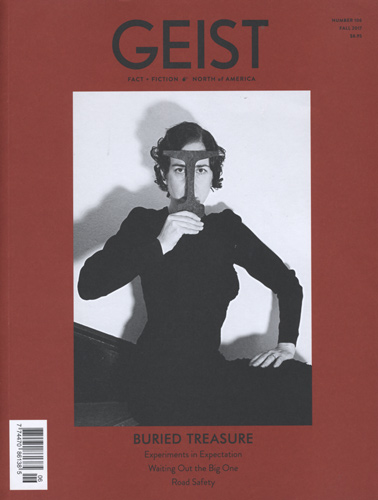Geist – Fall 2017
I was pleasantly intrigued looking through this Fall 2017 issue of the Canadian literary magazine, Geist. Between the unique artwork and photographs, I found interesting poems, anecdotes of encounters with native peoples, and unique short stories, culminating in a cryptic crossword puzzle that I am compulsively returning to.
I was pleasantly intrigued looking through this Fall 2017 issue of the Canadian literary magazine, Geist. Between the unique artwork and photographs, I found interesting poems, anecdotes of encounters with native peoples, and unique short stories, culminating in a cryptic crossword puzzle that I am compulsively returning to.
In this issue, one short story immediately drew me in, titled “Aus-piss-ee-ous,” by Scaachi Koul. The author has been in many publications and I can certainly see why after reading this story. Here, the author shares insights of an Indian wedding and the long, extensive process that non-Indians won’t see. She gives a peek behind the colorful curtain of amazing dresses, fabrics, music, and food to show the true, deeper purpose of the weddings, where the “trips to India for Indian people are the furthest from ‘vacation.’” For her, going to India for a wedding is important because “You’re going so you can touch the very last of your bloodline, to say hello to the new ones and goodbye to the older ones, since who knows when you’ll visit them again.”
Despite the difficulty of the trip and the many expectations made on her throughout it, she is reminded that this wedding must be “aus-piss-ee-ous,” even if no one who uses the word understands the meaning of it. The wedding must be perfect because it serves a greater meaning—the entire future of the family. This weight presses down on the narrator as she watches the engagement and fuss. Her sullen but compliant adherence to these traditions reminds me of how we are all subject to expectations like this from our families, whatever they might be. We know they exist and we try to live up to them, even when we might really want to shrug them off and move on.
I really enjoyed reading the winners of the 13th Annual Literal Literary Postcard Story Contest. In this contest, the writer picks a postcard with an image and then creates a story that connects to that image in less than 500 words. The issue includes the top three creations, and each one was unique and interesting.
In the first-place position is “The Foggeries” by Jimmy Armstrong, with a postcard image of fishing boats on a foggy morning. The story presents “fogs” as a commodity, produced by companies and shipped all over, providing different types of fogs. In the second-place position is “The Fastest I Fell in Love” by Jessica Lampard, with an image of a woman’s eyes. The story tells how a student falls in love with a girl in class who refuses to bow down to Sister Rose and withstands torment with dignity. In the third-place position is “Ingrid Everywhere” by Rachel Jansen, with an image of a Tasmanian devil with the words “Greetings from Tasmania.” She presents a story of a student who can be in multiple places around the world at the same time. All three stories are very interesting and use a unique perspective to connect with the image from the postcard.
A poem that really made an impression on me was “Equal Opportunity” by Jim Wong-Chu, originally published in 1986. Sadly, the poet passed away in July 2017. Here, the poem makes a powerful statement about equality where “the chinese could only ride / the last two cars / of the trains” until something major happens. Next, the position is switched where the Chinese now had to ride in the first two cars . . . until something else major happens. After that, equality is finally established, and “the chinese are now allowed / to sit anywhere.” It took several traumatic events, but eventually equal opportunity was found—even if some superstition was necessary.
I really enjoyed the excerpt from In a Wide Country, by Robert Everett-Green, titled “Tiny Prince.” It paints a picture of a great story about a boy and his mother. The mother tells him a story to entertain him, but the son keeps asking for more to the story. Finally, the mother gives him more, which twists the story’s ending in such a way that Jasper is left thinking, “I would know better next time. I wouldn’t ask for more, after an ending that was good enough.” It is a powerful life lesson for him, and it left me wondering what other lessons he gains during his adventures with his mother in the rest of the book.
With so many great stories, poems, and pieces of art in this issue of Geist, I was able to find many that became instant favorites for me or left me thinking about life in new ways. This is definitely a journal for people with eclectic and diverse tastes.
[www.geist.com]





